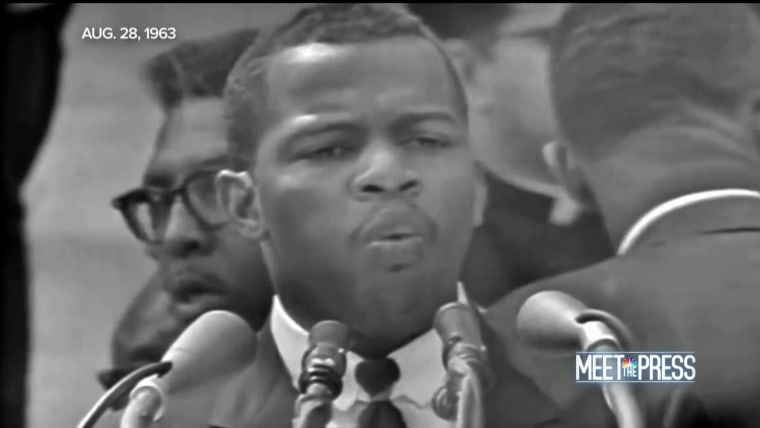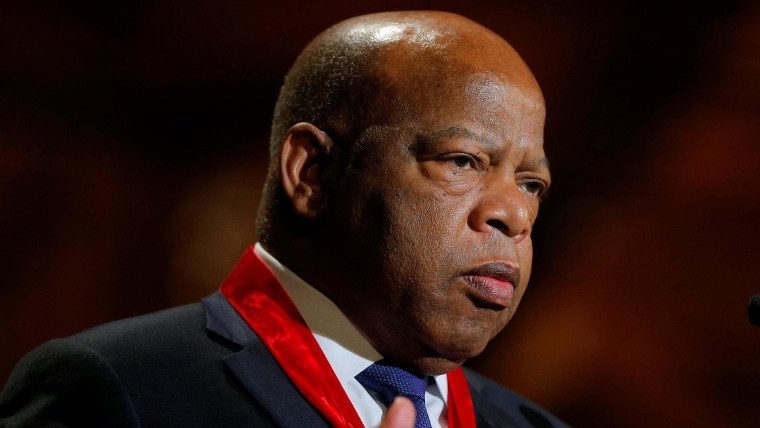John Lewis spent his life marching.
He was a young man in his early 20s when he led the march in Selma, Alabama across the Edmund Pettus Bridge where Alabama State Troopers cracked his skull and bloodied hundreds more.
He was 23 years old when he attended the March on Washington, and delivered a historic speech demanding civil rights not tomorrow, not next week, but today.
He marched his way to Congress, where he served the people of Georgia’s 5th district for decades.
And he marched his way to jail, getting arrested 40 times before becoming a congressman, and five more times after. “Good trouble,” he’d say.
When I think of Congressman Lewis’ legacy, the first word I think of is “march.” Because that was Rep. Lewis’ mission: to do as much as he could with the time he had. To do as much good, to get in as much good trouble, as life would allow. To march on.
Rep. Lewis’ life-long insistence to keep marching — no matter the obstacles — is what makes him not just my hero, but an American hero. Just like CT Vivian, another civil rights icon who passed away on the same day as Rep. Lewis. That persistence is what I’ll remember when I think about giving up. It’s what we all must remember when we consider giving up. The fight for justice is never easy. Rep. Lewis knew that better than most. It certainly doesn’t feel easy right now. But if the congressman us anything, it’s that we can never stop marching for what’s right.
In just over 100 days, we face the most consequential election of our lifetimes. Rep. Lewis’ legacy teaches us that we must never think “I’ve done enough.” Instead we must ask ourselves, “What more can I do?”
He spent his life asking what more he could do. And then he did it. And that’s what we all must do as we approach the presidential election this November. Because this November, we’re not just battling it out over who will occupy the Oval Office for the next four years. We’re fighting for the soul of our nation. This presidential election is a referendum on who we are as a country.
In 2018, just ahead of a historic midterm election that was already teeming with voter suppression, I had the opportunity to interview Rep. Lewis. I asked him one simple question: What’s at stake this election? His words have stayed with me ever since:
“Everything that we’ve accomplished in the last 50 years is [at stake]. The right to vote. The right to participate in the Democratic process is at stake,” he told me. “We have to go out and do what we can to save our democracy. To save ourselves…We’re all in the same house. We’re one America, we’re one people. We must learn to live on this planet together as brothers and sisters.”
These are Rep. Lewis’ marching orders. To fight with everything we’ve got for the right to vote, and to treat every person as a part of our home — because they are.
Rep. Lewis, the son of sharecroppers in a rural town outside of Troy, Alabama, fought for civil rights for his entire life. He learned about Rosa Parks when he was just 15 years old. His family told him to stay out of the way and to stay out of trouble. But at 17, Lewis met Parks. And at 18, he met Martin Luther King, Jr. These civil rights activists taught Lewis an important lesson: there are different kinds of trouble, and good trouble isn’t simply worthwhile, it’s necessary. In 2014, he delivered a commencement address at Emory University, where he encouraged students to get in good trouble: “You must find a way to get in the way. You must find a way to get in good trouble, necessary trouble.”
All of this, this would have been enough. More than enough for one man. Rep. Lewis was never satisfied with doing enough. And that’s why, on top of everything he suffered and gave to the civil rights movement, to this country, somehow he also found room in his soul to be hopeful. In that very same speech, he remarked to the students: “Never become bitter. Never become hostile. Never hate. Live in peace.”
Rep. Lewis had every reason in the world to be bitter and to feel hate. But he didn’t. Maybe because he had so much reason to hate is why he knew better than to waste his time in bitterness. He had other marching orders to attend to.
Rest in peace and rest in power, John Lewis. Let the rest of us memorialize his legacy by marching on towards justice — this November, and beyond.
Karine Jean-Pierre is a Senior Advisor for the Joe Biden 2020 Presidential Campaign. She is the author of “Moving Forward,” a story of how she found her call to action and how you can, too. Jean-Pierre’s roots are in politics, from grassroots organizing to running presidential campaigns. She worked in the Obama White House, managed political campaigns nationally and locally, and recently served as an MSNBC Political Analyst for MSNBC and MoveOn’s Chief Public Affairs Officer.













